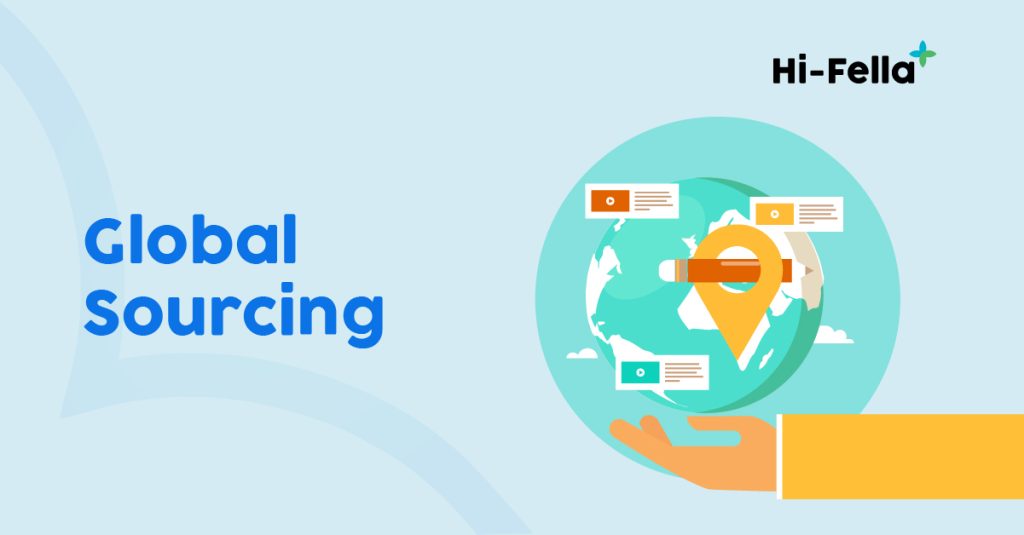Global sourcing has emerged as a strategic imperative for modern supply chains, reshaping the way businesses acquire raw materials, components, and finished products. In an increasingly interconnected world, where borders are no longer barriers but gateways to opportunity, understanding the nuances of global sourcing has become essential. This supply chain strategy involves procuring goods and services from suppliers located in various parts of the world, allowing companies to tap into a global marketplace of resources and expertise. Learn how businesses procure goods and services globally, optimizing costs and quality.
What is global sourcing?
What is global sourcing? Simply speaking, global sourcing is one of the supply chain strategies where a company procure goods or services from suppliers located in different countries around the world to get the best deal, either in terms of price or the quantity of the goods, rather than relying solely from local sources. Global products sourcing approach allows companies to tap into a global network of suppliers to meet their production and operational needs.
The worldwide market for outsourcing procurement services was valued at about $2.70 billion not too long ago. Now, experts think it’s going to get much bigger. By the year 2029, they predict it could be worth as much as $7.86 billion. That’s a big jump! It’s like saying your allowance might increase threefold in the next few years. And every year during this time, it’s expected to grow by about 14.29%, which is like steady and healthy growth.
Benefits
There are many benefits of global sources, including cost reduction, access to specialized resources, and risk diversification. Here are the benefits of global sources:
- Cost reduction
Companies can often find lower-cost suppliers in regions with lower labor and production costs, helping them reduce expenses. It has the effect where the product has a lower price for customers and increases profit to companies. - Access to specialized resources
You’ll have access to specialized resources where you cannot find it in your country if you utilize global sourcing. Global sourcing enables access to specialized skills, technologies, and materials that may not be available locally. This can expand your customer base and can be very beneficial for businesses who want to diversify their products. - Risk diversification
By sourcing from multiple regions, companies can spread their risk and minimize the impact of disruptions like natural disasters or economic downturns. If you only source from one country, you’d be likely to have a bigger risk. - Improved quality
When you buy products from countries with advanced manufacturing, you get access to top-quality goods that might not be available at home. These countries are really good at making stuff, and their products often meet the highest quality standards. So, by sourcing from them, your business can get better-quality products and stay ahead in the game. It’s like getting the best stuff from around the world.
Challenges
Global product sourcing might have many benefits, but it can come with many challenges too, such as cultural differences, logistics complexities, and geopolitical factors. Here are the challenges of global sources:
- Cultural differences
Managing relationships with suppliers from diverse cultures can lead to communication and collaboration challenges. When dealing with suppliers from different countries, it’s important for businesses to pay attention to cultural differences and how people communicate. This helps prevent misunderstandings and lays the foundation for strong and successful partnerships. - Logistics complexities
Coordinating the movement of goods across international borders can be complex, involving customs regulations, shipping, and warehousing issues. These include tariffs, quotas, additional documents, and hidden costs that can make importing goods difficult and costly. - Geopolitical factors
Political instability, trade disputes, and changes in regulations in supplier countries can impact the supply chain. Take, for instance, when the value of money (currency exchange rates) changes or when there’s political trouble in the area where you’re getting your stuff from. These things can mess with how much products cost and whether you can even get them. Natural disasters could also cause disruption to move your imported products across the globe.
Strategic considerations
To import some goods from other countries, you need advanced strategic planning and consideration. Picking the right suppliers from different parts of the world is super important. You need to check if they make good-quality stuff, offer reasonable prices, and can be trusted to deliver on time. Think of it as choosing the best teammates for your project. Once you’ve got your suppliers on board, it’s not just a one-time deal. You need to stay in touch, talk to them, and work together smoothly. Building a strong friendship with your suppliers helps everything run better, just like how good teamwork makes a sports team win more games. So, keeping those connections strong is key to your sourcing strategy’s success.
Ready to elevate your global sourcing game? Join Hi-Fella today, a global sources company where suppliers and buyers from around the world meet. Head to our website, download our app on Play Store or App Store, and sign up for an account. Don’t miss out on the chance to streamline your sourcing processes, access a global network of suppliers, and supercharge your business growth. Join us now and revolutionize your approach to sourcing!








